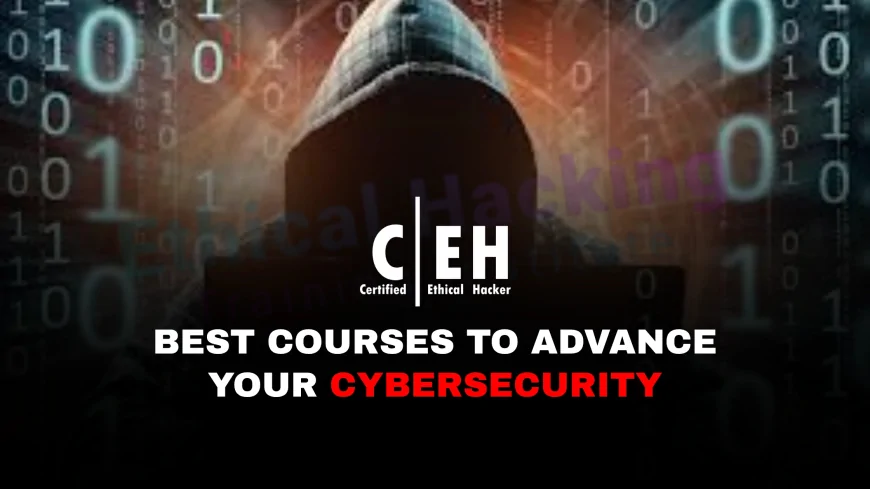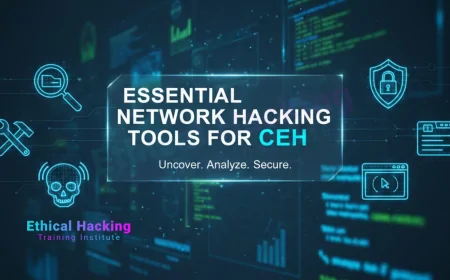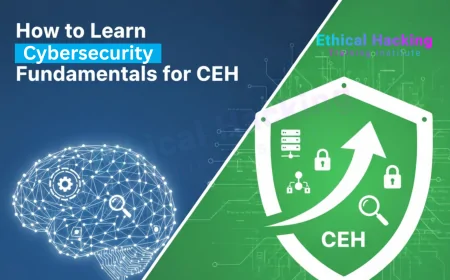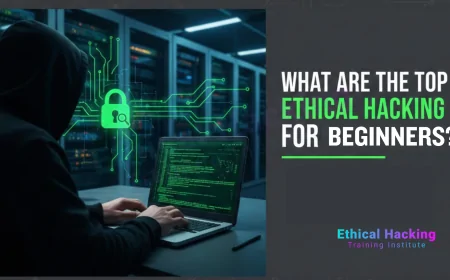Master Computer Hacking with These Top Courses | Advance Your Cybersecurity Career with These Hacking Courses
Discover the best computer hacking courses to become an ethical hacker. Learn about hands-on labs, tools, certifications like CEH and OSCP, and build a successful cybersecurity career.

Table of Contents
- Introduction
- Why Master Computer Hacking?
- Prerequisites & Mindset
- Types of Top Hacking Courses
- Essential Tools & Labs
- Structured Learning Path
- Real‑World Practice & Internships
- Key Certifications
- Challenges & How to Overcome
- Career Opportunities
- Continuous Learning & Growth
- FAQs
- Conclusion
Introduction
In today's digital-first world, cyber threats are more sophisticated than ever—making skilled ethical hackers essential in every industry. If you're intrigued by the idea of protecting systems, uncovering vulnerabilities, and mastering the same tools hackers use (legally), you're in the right place. Mastering computer hacking is no longer reserved for elite coders—anyone with dedication and the right training can enter this exciting field.
This guide explores the top computer hacking courses that will teach you both the theory and hands-on skills needed to thrive in cybersecurity. From beginner-friendly platforms like TryHackMe to advanced certifications like CEH and OSCP, we’ll walk you through the most effective paths, tools, virtual labs, and learning strategies. Whether you're starting from scratch or aiming to level up, these courses offer a structured and proven approach to help you become a confident, certified ethical hacker.
Why Master Computer Hacking?
- High Demand: Cyber threats are increasing, making skilled ethical hackers essential.
- Lucrative Careers: Salaries range from ₹6–30 LPA in India and $80K+ globally.
- Defensive Advantage: Understanding attack methods helps in designing better protection.
- Technical Versatility: Involves networking, scripting, forensics, and reverse engineering.
Prerequisites & Mindset
- Networking fundamentals – TCP/IP, routing, switching
- Linux and Windows basics
- Basic scripting – Python, Bash, PowerShell
- Curiosity, patience, resilience, and ethics
Types of Top Hacking Courses
- Introductory: Security+, eJPT
- Certification Prep: CEH, PenTest+
- Practical Intensive: OSCP, OSWE
- Specialized Tracks: web, mobile, IoT, cloud hacking
- Bootcamps: fast‑paced 5–10 day deep dives
Essential Tools & Labs
- Nmap, Nessus – scanning
- Metasploit, SQLMap – exploitation
- Burp Suite, ZAP – web hacking
- Wireshark, Tcpdump – packet analysis
- Aircrack‑ng, John‑the‑Ripper – wireless and hash cracking
- Ghidra, Radare2 – reverse engineering
- TryHackMe, HTB, virtual VMs – safe practice environments
Structured Learning Path
- Weeks 1–2: Setup labs, learn networking & Linux basics
- Weeks 3–4: Reconnaissance and scanning techniques
- Weeks 5–6: Exploitation frameworks & web hacking
- Weeks 7–8: Post‑exploitation, lateral movement
- Weeks 9–10: Wireless, script automation
- Weeks 11–12: Mock challenges, portfolio build, certification prep
Real‑World Practice & Internships
- Participate in CTFs (CTFtime)
- Bug bounty platforms (HackerOne, Bugcrowd)
- Intern in SOC or security teams
- Contribute to open‑source security projects
Key Certifications
- eJPT, Security+ – foundational
- CEH, PenTest+ – intermediate
- OSCP, OSWE – practical and technical depth
- GPEN, CISSP – advanced professional levels
Challenges & How to Overcome
- Information overload: Focus on one domain at a time
- Technical errors: Use community forums and guides
- Procrastination: Set study schedules and goals
- Skill retention: Use labs and teach peers
Career Opportunities
- Ethical Hacker / Penetration Tester
- SOC Analyst / Incident Responder
- Security Consultant / Red Teamer
- Bug Bounty Specialist / Freelance Security Auditor
Continuous Learning & Growth
- Stay current via security blogs, podcasts, threat reports
- Join meetups, conferences, and communities online
- Mentor others and build your personal brand
- Specialize in emerging fields—cloud security, AI hacking
FAQs
1. Do I need to code?
Basic scripting (Python/Bash) helps but isn’t mandatory initially.
2. Which course should I start with?
Beginners can start with TryHackMe or Security+ before moving to CEH or OSCP.
3. Are labs necessary?
Absolutely—a lab environment is essential for skill building.
4. How much time per week?
8–12 hours per week over 3 months is a solid commitment.
5. What’s better—CEH or OSCP?
CEH offers recognized credentials; OSCP is more technical and practical.
6. Can I work while learning?
Yes—self-paced courses and weekend bootcamps are flexible.
7. Is ethical hacking legal?
Yes—when performed under explicit permission and scope.
8. What salary range is realistic?
Entry-level roles in India start at ₹6–8 LPA and $80K+ globally.
9. Do I need a degree?
No—certifications, skills, and experience are prioritized.
10. How to track progress?
Use lab logs, CTF rankings, and certification prep scores.
11. What if I fail a certification?
You can retake the exam after a waiting period and fee payment.
12. What’s a CTF?
Capture‑the‑Flag is a gamified challenge for hacking skills.
13. Should I join bug bounties?
Yes—they offer real-world practice and reward outcomes.
14. Is mentorship important?
Yes—guidance accelerates your learning path.
15. How to handle lab errors?
Document issues and seek help in forums or course communities.
16. How often should I update skills?
Stay current monthly—new threats emerge regularly.
17. Are expensive courses worth it?
High‑end courses like SANS are excellent, but free resources can be enough initially.
18. Can I freelance after certification?
Yes—bug bounty and freelance pentesting are accessible paths.
19. What defines success?
Consistent practice, a strong lab portfolio, and ethical behavior define a successful hacker.
20. What’s my next step?
Start a structured path—pick a course, build a lab, get certified, join CTFs, and network with peers.
Conclusion
Mastering computer hacking is a journey that blends theory, hands-on labs, certifications, and real-world practice. By following top courses, practicing with key tools, earning respected certifications, and staying engaged with community, you’ll build a secure and rewarding cybersecurity career. Keep learning, stay ethical, and challenge yourself every day.
What's Your Reaction?
 Like
0
Like
0
 Dislike
0
Dislike
0
 Love
0
Love
0
 Funny
0
Funny
0
 Angry
0
Angry
0
 Sad
0
Sad
0
 Wow
0
Wow
0

















